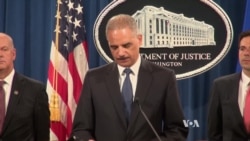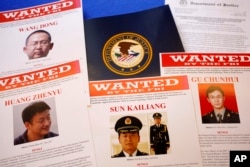WHITE HOUSE —
The United States has filed charges against five Chinese military officials it accuses of stealing business secrets from American companies.
Obama administration officials say the criminal indictments - the first of their kind against foreign government officials - are meant to send a message that the U.S. wants China to stop stealing cyber secrets.
“We have consistently and candidly raised these concerns with the Chinese government, and today's announcement reflects our growing concerns that this behavior has continued,” said White House Spokesman Jay Carney.
The U.S. accuses officials of a unit of China's People's Liberation Army [Department 61398 in Shaghai] of stealing secrets from U.S. metals, nuclear and solar energy companies to give Chinese firms - including state-owned ones - a business advantage.
Announcing the indictments Monday, the top U.S. prosecutor, Attorney General Eric Holder, said the thefts have provided significant information to Chinese companies.
China responded quickly, saying it will suspend participation in a China-U.S. Internet working group. It called the cyber spying allegations absurd.
Carney said the U.S. will continue to engage with China, but he said Washington needed to send a message.
“We believe there are ample and important areas where we can and should be able to cooperate with China on issues related to cyber security. But it is also very important that the rules of the road are established,” he said.
A U.S. State Department spokeswoman Jen Psaki said the United States regrets the action taken.
"We regret China’s decision on the suspension of activities of the working group. We continue to believe that dialogue is an essential part of resolving these and other cyber security concerns," she said.
Carney said there is no comparison between China's stealing of business secrets for commercial gain and American intelligence gathering - which he said is done in the interest of U.S. national security, not money.
Industrial espionage
Six American companies, including United States Steel , Alcoa, Allegheny Technologies, Westinghouse Electric, SolarWorld, United Steel Workers Union were victims of Chinese hacking attacks, U.S. officials said. Also targeted were Paper and Forestry, Rubber, Manufacturing, Energy, Allied-Industrial and Service Workers International Union.
Underscoring that this was "a real threat to our economy and security," Holder said the Chinese hackers stole information that provides China's competitors with insight into the "strategy and vulnerabilities" of American companies in key industries.
"The alleged hacking appears to have been conducted for no reason other than to advantage state-owned companies and other interests in China, at the expense of businesses here in the United States," said Holder.
"Our economic security and our ability to compete fairly in the global marketplace are directly linked to our national security," he added. "When a foreign nation uses military or intelligence resources and tools against an American executive or corporation to obtain trade secrets or sensitive business information for the benefit of state-owned companies, we must say, enough is enough."
An American computer security company says the Shanghai unit at the heart of U.S. economic espionage allegations against Chinese military officers has been spying for years on companies around the world.
In a report earlier this year, Washington-based Mandiant said it found that hundreds, perhaps thousands, of workers at the People's Liberation Army unit have hacked into the computers at 141 companies in 20 major industries since 2006, mostly in English-speaking countries. Mandiant says the Chinese military stole secretive information about their business operations and passed it on to Chinese companies, including state-run enterprises.
Early fallout
China's foreign ministry denounced the charges as "fabricated" and said they would undermine trust between the two governments. In protest, Beijing said it is suspending the activities of a Sino-U.S. Internet working group.
Whether the five Chinese military officers ever stand trial in the U.S. is an open question.
Holder said the U.S. is hopeful that Beijing "will respect our criminal justice system" and allow the accused military officers to be brought to trial. "It is our hope to have these people stand before an American jury and face justice," he said.
The U.S. identified the five military officers as Wang Dong, Sun Kailiang, Wen Xinyu, Huang Zhenyu and Gu Chunhui, all of whom face 31 charges, each of which each carries a 15-year prison term.
Wen Yunchao, a China Internet expert based in New York, told VOA's Mandarin service that he thinks the indictments are part of a bigger picture.
“I think the criminal charges against Chinese officials can be considered as part of U.S. pivot to Asia policy. And of course, it could have something to do with the upcoming U.S. congressional midterm elections as well. It’s not an isolated case.”
The charges pit the world's two biggest economies against each other.
The United States has an overall economic output that is twice the size of China's, about $16 trillion to $8 trillion annually. Some analysts say that by other measures, however, China could surpass the United States within the year as the world's biggest economy.
Unfair advantage
Stolen trade secrets could be a short-cut to developing products that unfairly compete with U.S. products. That is because it is far cheaper to steal plans than to do the research and take the time needed to develop an original product. That cost savings can give the thief a major advantage in pricing products.
The hackers also are accused of spying on companies involved in trade disputes and business negotiations with China, to give Chinese state-owned firms an unfair advantage against their American rivals.
Much of this activity targeted offices in the Pittsburgh, Pennsylvania, area. The chief prosecutor in western Pennsylvania, David Hickton, said hacking has forced some plants to close, throwing people out of work.
"The important message is that cyber theft impacts real people, in real and painful ways. The lifeblood of any organization is the people who work, strive, and sweat for it," said Hickton. "When these cyber intrusions occur, production slows, plants close, workers get laid off and lose their homes."
American officials have long been concerned about hacking from abroad, especially China. An FBI official told Reuters last week to expect multiple cyber security-related cases, including indictments and arrests, in the coming weeks.
Long-standing concern
While such charges may be largely symbolic, the move would prevent the individuals indicted from traveling to the United States or other countries that have an extradition agreement with the U.S.
Several cyber security experts say Monday's action show the U.S. is serious about dealing with hacking.
“It sends a strong message to the Chinese,” a senior fellow at the Center for Strategic and International studies James Lewis told Reuters.
Others some remained skeptical the move would deter online invasions.
“It won't slow China down,” said Eric Johnson, an information technology expert at Vanderbilt University and dean of its School of Management.
On Sunday, a top Chinese Internet official called for Beijing to tighten its own cyber security, citing “overseas hostile forces.”
VOA's Jim RandIe in Washington contributed information for this report, along with Reuters.
Obama administration officials say the criminal indictments - the first of their kind against foreign government officials - are meant to send a message that the U.S. wants China to stop stealing cyber secrets.
“We have consistently and candidly raised these concerns with the Chinese government, and today's announcement reflects our growing concerns that this behavior has continued,” said White House Spokesman Jay Carney.
The U.S. accuses officials of a unit of China's People's Liberation Army [Department 61398 in Shaghai] of stealing secrets from U.S. metals, nuclear and solar energy companies to give Chinese firms - including state-owned ones - a business advantage.
Announcing the indictments Monday, the top U.S. prosecutor, Attorney General Eric Holder, said the thefts have provided significant information to Chinese companies.
China responded quickly, saying it will suspend participation in a China-U.S. Internet working group. It called the cyber spying allegations absurd.
Carney said the U.S. will continue to engage with China, but he said Washington needed to send a message.
“We believe there are ample and important areas where we can and should be able to cooperate with China on issues related to cyber security. But it is also very important that the rules of the road are established,” he said.
A U.S. State Department spokeswoman Jen Psaki said the United States regrets the action taken.
"We regret China’s decision on the suspension of activities of the working group. We continue to believe that dialogue is an essential part of resolving these and other cyber security concerns," she said.
Carney said there is no comparison between China's stealing of business secrets for commercial gain and American intelligence gathering - which he said is done in the interest of U.S. national security, not money.
Industrial espionage
Six American companies, including United States Steel , Alcoa, Allegheny Technologies, Westinghouse Electric, SolarWorld, United Steel Workers Union were victims of Chinese hacking attacks, U.S. officials said. Also targeted were Paper and Forestry, Rubber, Manufacturing, Energy, Allied-Industrial and Service Workers International Union.
Underscoring that this was "a real threat to our economy and security," Holder said the Chinese hackers stole information that provides China's competitors with insight into the "strategy and vulnerabilities" of American companies in key industries.
"The alleged hacking appears to have been conducted for no reason other than to advantage state-owned companies and other interests in China, at the expense of businesses here in the United States," said Holder.
"Our economic security and our ability to compete fairly in the global marketplace are directly linked to our national security," he added. "When a foreign nation uses military or intelligence resources and tools against an American executive or corporation to obtain trade secrets or sensitive business information for the benefit of state-owned companies, we must say, enough is enough."
An American computer security company says the Shanghai unit at the heart of U.S. economic espionage allegations against Chinese military officers has been spying for years on companies around the world.
In a report earlier this year, Washington-based Mandiant said it found that hundreds, perhaps thousands, of workers at the People's Liberation Army unit have hacked into the computers at 141 companies in 20 major industries since 2006, mostly in English-speaking countries. Mandiant says the Chinese military stole secretive information about their business operations and passed it on to Chinese companies, including state-run enterprises.
Early fallout
China's foreign ministry denounced the charges as "fabricated" and said they would undermine trust between the two governments. In protest, Beijing said it is suspending the activities of a Sino-U.S. Internet working group.
Whether the five Chinese military officers ever stand trial in the U.S. is an open question.
Holder said the U.S. is hopeful that Beijing "will respect our criminal justice system" and allow the accused military officers to be brought to trial. "It is our hope to have these people stand before an American jury and face justice," he said.
The U.S. identified the five military officers as Wang Dong, Sun Kailiang, Wen Xinyu, Huang Zhenyu and Gu Chunhui, all of whom face 31 charges, each of which each carries a 15-year prison term.
Wen Yunchao, a China Internet expert based in New York, told VOA's Mandarin service that he thinks the indictments are part of a bigger picture.
“I think the criminal charges against Chinese officials can be considered as part of U.S. pivot to Asia policy. And of course, it could have something to do with the upcoming U.S. congressional midterm elections as well. It’s not an isolated case.”
The charges pit the world's two biggest economies against each other.
The United States has an overall economic output that is twice the size of China's, about $16 trillion to $8 trillion annually. Some analysts say that by other measures, however, China could surpass the United States within the year as the world's biggest economy.
Unfair advantage
Stolen trade secrets could be a short-cut to developing products that unfairly compete with U.S. products. That is because it is far cheaper to steal plans than to do the research and take the time needed to develop an original product. That cost savings can give the thief a major advantage in pricing products.
The hackers also are accused of spying on companies involved in trade disputes and business negotiations with China, to give Chinese state-owned firms an unfair advantage against their American rivals.
Much of this activity targeted offices in the Pittsburgh, Pennsylvania, area. The chief prosecutor in western Pennsylvania, David Hickton, said hacking has forced some plants to close, throwing people out of work.
"The important message is that cyber theft impacts real people, in real and painful ways. The lifeblood of any organization is the people who work, strive, and sweat for it," said Hickton. "When these cyber intrusions occur, production slows, plants close, workers get laid off and lose their homes."
American officials have long been concerned about hacking from abroad, especially China. An FBI official told Reuters last week to expect multiple cyber security-related cases, including indictments and arrests, in the coming weeks.
Long-standing concern
While such charges may be largely symbolic, the move would prevent the individuals indicted from traveling to the United States or other countries that have an extradition agreement with the U.S.
Several cyber security experts say Monday's action show the U.S. is serious about dealing with hacking.
“It sends a strong message to the Chinese,” a senior fellow at the Center for Strategic and International studies James Lewis told Reuters.
Others some remained skeptical the move would deter online invasions.
“It won't slow China down,” said Eric Johnson, an information technology expert at Vanderbilt University and dean of its School of Management.
On Sunday, a top Chinese Internet official called for Beijing to tighten its own cyber security, citing “overseas hostile forces.”
VOA's Jim RandIe in Washington contributed information for this report, along with Reuters.











